June 10, 2016, by Kathryn Steenson
Chimera Obscura? – The Value of the University’s Special Archive and Foreign-Language Skills
This is a guest post by UoN student George Jewitt about his CLAS student placement at Manuscripts and Special Collections in March/April 2016.
If you’ve never been to King’s Meadow Campus, it’s worth a visit for a few reasons. The Costa is pretty cosy and it’s a great place to sit and do some work far from distractions. A five-minute Hopper ride delivers you to an odd-shaped building, hidden amongst warehouses and trees in a nearby industrial estate. Making your way to the Manuscripts and Special Collections department, you find yourself navigating a labyrinth of wide, identical corridors, the echoes of whose past (as the converted TV studio for such old favourites as Crossroads, The Price is Right, Supermarket Sweep, Bullseye, and Family Fortunes) are now obscured by sleek promotional signs for the University. My placement advisor – just one of the very amicable and well-read team at MSC – informed me of my tasks involving the collection’s German & Russian-language inventory and took me behind-the-scenes. Access to the vast store, filled with shelves, pipes of the humidity control system snaking across beams and blacked-out walls, is a privilege only of trusted employees and lucky volunteers like myself, and the first questions that comes to mind upon entering is “Where did this all come from?”
The university often receives donations upon the closure of institutes or deaths of people who have ties with it. The hidden gems among these range from scrapbooks containing decades worth of newspaper clippings about mysterious deaths by poisoning in the UK, the contents of an entire library simply transferred straight from East Germany, to centuries-old books – including early Shakespearean works – which can all be ordered for viewing in the reading room outside. Of course, great care is taken to keep the stored materials in as good a condition as possible; it was a great privilege to be able to work with them hands-on as a volunteer!
My advisor gave me several projects, on which I was to work individually but would receive assistance should I need it:
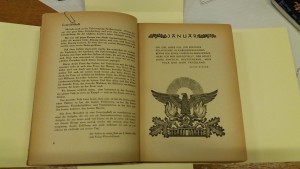
1) Reorganize the Third Reich Collection (works published in Nazi Germany 1933 – 1945) and make a display called “Photography in the Third Reich”. Sitting in the reading room just like any other user of special collections materials, I naturally came across the odd Swastika and anti-Semitism, however what stood out above all was the surprising normality of many of the images and the concerning ease at which one could be impressed at the euphoria of the propaganda. It’s difficult not to think about how cool it would have been, as a teenage boy, to own something that could teach you boxing moves and how to deconstruct a rifle – like the Hitler-Jugend Handbook. One particular gem was the discovery that the German Navy often kept young exotic animals on board to entertain the crew, and painted the walls behind their cages to make them feel at home.
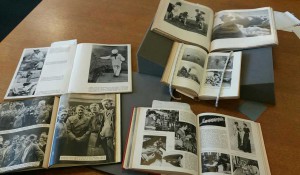
2) Summarise five volumes of handwritten letters in German, sent by Otto Siepmann (a renowned and significant influencer of language education in the UK) to his son throughout his secondary school and university years from 1902 to 1914. I highlighted potential areas for future research and found out additional information about them. Reading about how to apply for university, communicate and organise trips and finances with your parents through letters – with all the accompanied strictness and expectations of the early 20th century– was interesting and a real eye-opener for a student today!
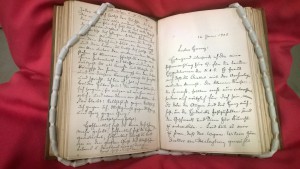
3) Sort, box and label British Intelligence Objectives Sub-Committee reports on German industry and various periodicals that were once part of the Cotton Corporation’s library. I also re-organised the 700+ Russian-language works from the late 18th Century to Soviet era to potentially create new collections and stimulate new research interest, which was particularly rewarding because I was the only member of the team who was able to understand what the Russian works were about!
In general, all this was to allow academics and students greater access to these untapped resources in future. This might seem a potentially tedious engagement to some, or quite therapeutic to those of the more order-obsessed and academic persuasion like myself. Regardless, this short, manageable, and very insightful experience offers students the chance to leave a productive mark on the university before graduating. It also shows that foreign-language skills can be applied in so many ways that often do not occur to us.
In short, I greatly enjoyed my time in Manuscripts and Special Collections and I would recommend it to anyone, if not just to give you a greater appreciation of what academic resources and support are available, and of the behind-the-scenes work by university staff that we rely so much and of which we are often unaware.
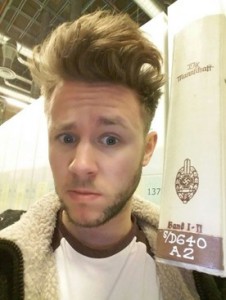 I took part in this placement after applying for it through the CLAS Work Placements scheme. The project is still on-going, great if you like history, literature and/or languages, and you can get a great reference for your CV! For further information about this (and see if it can become a 10 credits of your degree or 20 credits of the Nottingham Advantage Award!) please see: https://www.nottingham.ac.uk/clas/prospective/undergraduate/careers-and-employability.aspx and contact Elizabeth Yearsley at mzzey@exmail.nottingham.ac.uk
I took part in this placement after applying for it through the CLAS Work Placements scheme. The project is still on-going, great if you like history, literature and/or languages, and you can get a great reference for your CV! For further information about this (and see if it can become a 10 credits of your degree or 20 credits of the Nottingham Advantage Award!) please see: https://www.nottingham.ac.uk/clas/prospective/undergraduate/careers-and-employability.aspx and contact Elizabeth Yearsley at mzzey@exmail.nottingham.ac.uk
If you’d like to view these collections, or any of our archives and rare books, please contact us to make an appointment. For more information about our holdings, please visit our website. You can also follow us on Twitter @mssUniNott or read our newsletter, Discover.
No comments yet, fill out a comment to be the first

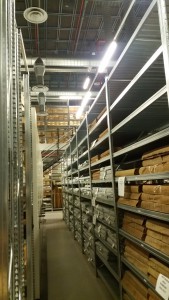
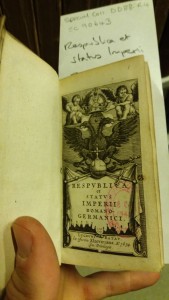
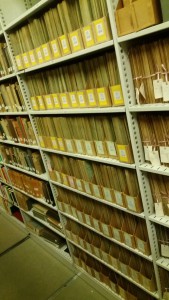
Leave a Reply